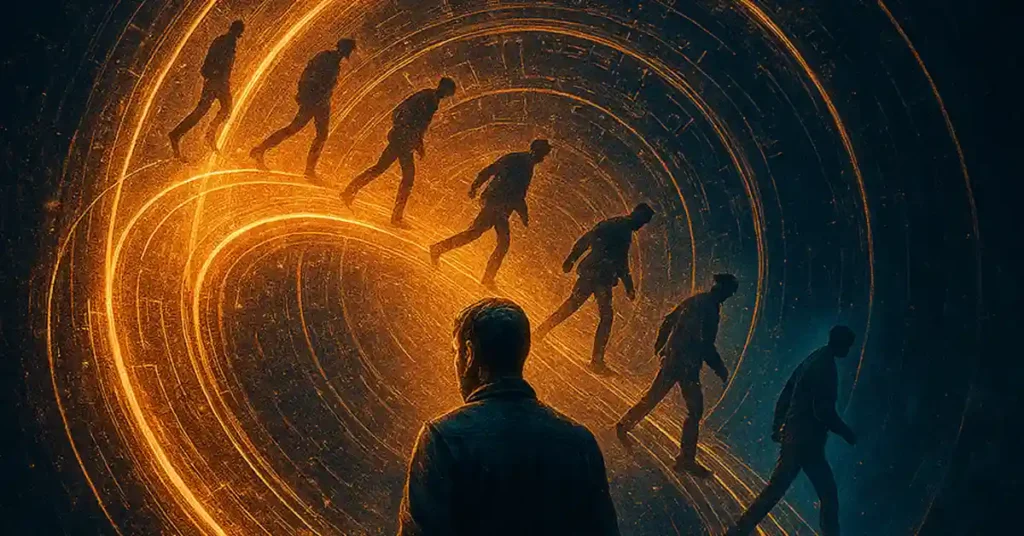Time travel has always fascinated storytellers, philosophers, and physicists alike—but no time travel concept is as twisted and mind-bending as the predestination paradox.
If you’ve ever wondered how someone could be their own grandfather, why a time traveler might create the very future they’re trying to stop, or whether fate is truly set in stone—then buckle up.
Let’s unpack one of time travel’s most perplexing ideas.
What Is the Predestination Paradox?
The predestination paradox (sometimes called a causal loop or closed loop paradox) occurs when a time traveler’s actions in the past become the very cause of the event they are trying to prevent—or worse, the reason they exist in the first place.
In other words, the future causes the past, and the past causes the future, forming a loop with no discernible origin.
Origins of the Paradox
The concept of the predestination paradox has its roots in philosophical questions about determinism and free will, but it really gained traction in science fiction during the mid-20th century.
The term emerged from discussions about Einstein’s theory of relativity and Gödel’s solutions to Einstein’s equations, which allowed for the theoretical possibility of closed timelike curves—paths through space-time that loop back on themselves.
Writers began to wonder: what if traveling back in time didn’t change the past… but fulfilled it?
That’s where the paradox begins.

A Classic Example: The Bootstrap Identity Crisis
Let’s look at a classic example.
Imagine a man named John. One day, he meets a mysterious stranger who hands him a book on physics that changes his life. Inspired, John studies science, invents a time machine, and travels back in time to give the same book to his younger self.
Here’s the twist: Where did the book originally come from?
It has no true point of creation. It exists in a self-contained loop because of time travel. This is a variation of the predestination paradox known as the bootstrap paradox, and it often works hand-in-hand with predestination concepts.
A Pure Predestination Example: You Can’t Stop It
Now, let’s go darker.
In a predestination paradox, the time traveler tries to prevent something—say, a catastrophe. But in trying to stop it, they become the cause of it.
Let’s say Sarah travels back in time to stop a war. While trying to stop the assassination of a political leader, she inadvertently kills someone whose death sparks the conflict. Her actions, meant to save the world, are exactly what doomed it.
That’s the predestination paradox in action: Your choices lead directly to the outcome you’re trying to avoid, and you were always meant to do it.
Philosophical and Scientific Implications
The predestination paradox raises some disturbing questions:
Is free will an illusion?
Can the past ever be changed?
Are we just playing out a script that’s already written?
In block universe theory, where all points in time exist equally, the answer is yes—you’re just experiencing one frame in a fixed film strip.
But not all physicists agree. Some favor the many-worlds interpretation, which offers a multiverse escape hatch—where every decision splits reality and creates alternate timelines.
Still, in a predestination paradox, there’s no escape. Your actions are the cause and the effect. You’re part of the loop.
Predestination in Fiction: Mind-Bending Stories
Some of the most compelling sci-fi stories are based on predestination paradoxes:
“Predestination” (2014) – A time-travel thriller that explores identity, fate, and a horrifyingly perfect loop.
12 Monkeys (1995) – A man is sent back to prevent a global plague… and his presence helps cause it.
The Terminator (1984) – Kyle Reese travels back in time to protect Sarah Connor—and becomes the father of John Connor, the very leader who sent him.
Each of these stories explores the uncomfortable idea that our attempts to change destiny might be the very reason destiny exists.
How This Ties into The Silent Guardian
In The Silent Guardian, Adam’s journey through time is riddled with the question: Is he changing the future—or completing it?
There are moments when he believes he can break the cycle, only to realize that every action he takes has already been accounted for by the very system he wants to dismantle.
Like many time travelers before him, Adam finds himself caught in the web of causality—where prophecy isn’t a warning, but a script he was born to follow.
Final Thought
So—what is the predestination paradox?
It’s the unsettling idea that the time loop is unbreakable. That our choices might not be choices at all, but puzzle pieces snapping into place exactly as they must.
Whether you see it as destiny or a cosmic trap, the predestination paradox reminds us: when it comes to time, the line between cause and effect might just be an illusion.
